‘Is this the most sycophantic speech by an Australian prime minister? Julia Gillard’s address to the United States Congress, March 2011’, Honest History, 19 July 2016
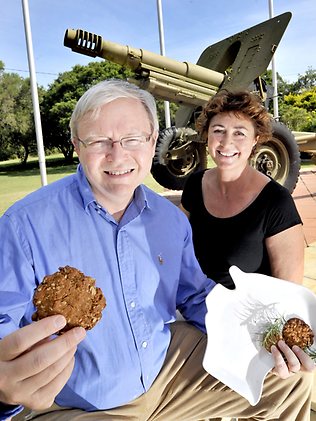 Former Prime Minister Rudd gets Anzac biscuit, 2012 (Courier-Mail/Brad Cooper)
Former Prime Minister Rudd gets Anzac biscuit, 2012 (Courier-Mail/Brad Cooper)
Anzackery precedents: Hawke and Rudd
As Honest History talks to people about Anzackery and its exponents we are often told that Prime Minister John Howard started it all. We politely point out that, to the extent that prime ministers can be blamed for this sentimental, sometimes unctuous version of the Anzac legend – many people would argue that our leaders just respond to demand from us – Bob Hawke got there well before John Howard. Prime Minister Hawke said this, for example, at Gallipoli on Anzac Day, 1990, in a speech remarkably reminiscent, even to the number of words it contained, of Lincoln’s Gettysburg Address:
[B]ecause of the courage with which they fought, because of their devotion to duty and their comradeship, because of their ingenuity, their good humour and their endurance, because these hills rang with their voices and ran with their blood, this place Gallipoli is, in one sense, a part of Australia.
If one compares prime ministerial Anzac speeches on the Honest History website, though, the prize – the biscuit – for the most unctuous and cringe-worthy goes comfortably to Prime Minister Kevin Rudd in Canberra on Anzac Day, 2010.
Neither religious nor secular, whatever our beliefs are, ANZAC is profoundly spiritual – inspiring pilgrimages still to that far-off place where our modern-day pilgrims drink deep from the well of national memory. So what is this legend that we call ANZAC? How has it shaped our nation’s life? How does it offer quiet counsel and gentle direction as we seek to chart our future? And how do we best nurture its flame for another century as we approach the first centenary of the ANZAC landings? I believe each generation of Australians has a duty to pass this torch to the next.
Holt and Gorton and hands across the Pacific
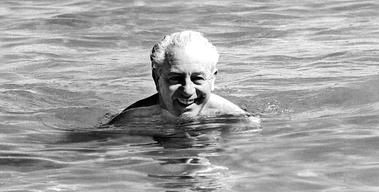 Prime Minister Holt (Newspix/News Ltd)
Prime Minister Holt (Newspix/News Ltd)
This prime ministerial tendency to go over the top, three bags full, laid on with a trowel, also comes out in speeches to do with the American alliance. Prime Minister Harold Holt famously said this to President Lyndon Johnson in June 1966:
And so, sir, in the lonelier and perhaps even more disheartening moments which come to any national leader, I hope there will be a corner of your mind and heart which takes cheer from the fact that you have an admiring friend, a staunch friend, that will be all the way with LBJ.
In Holt’s defence, we should note that he was just parroting LBJ’s standard election slogan.
Prime Minister John Gorton then came up with this in front of President Richard Nixon in May 1969:
I think that we will stand together in the future as we have in the past, the great, the small, the comparatively small, but fired by the same motives, inspired by the same ideas, resolute in the same way … [W]herever there is a joint attempt to improve not only the material but the spiritual standards of life of the peoples of the world, then, Sir, we will go Waltzing Matilda with you.
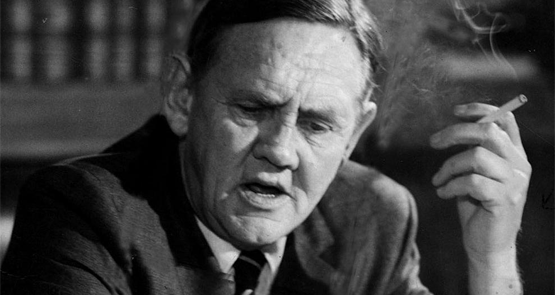 Prime Minister Gorton (Crikey)
Prime Minister Gorton (Crikey)
Julia Gillard and the Moon landing
There is some notable rhetoric in those speeches. Yet Richard Butler AC, former diplomat, former UN weapons inspector, former Governor of Tasmania, had occasion recently to give the prize for overblown fustian to Prime Minister Julia Gillard for her speech to a Joint Session of the United States Congress in March 2011. Butler said the speech ‘reached unprecedented heights of sycophancy’, which definitely sounds like a prize winner even in distinguished company. Let’s look at the speech and see if we agree.
‘You have a true friend down under’, the prime minister began. For her generation, the ‘defining image’ of America was the moon landing in 1969. (She was eight years old at the time, not long arrived in Australia.)
I’ll always remember thinking that day: Americans can do anything. Americans helped free the world of my parents’ generation. Americans inspired the world of my own youth. I stand here and I see the same brave and free people today. I believe you can do anything still. There is a reason the world always looks to America. Your great dream – life, liberty and the pursuit of happiness – inspires us all.
 Childhood heroes, 1969 (Kidport)
Childhood heroes, 1969 (Kidport)
Australians, she went on, were ‘not given to overstatement’, they were ‘laconic speakers’ and ‘realistic thinkers’.
In both our countries, real mates talk straight. We mean what we say. You have an ally in Australia. An ally for war and peace. An ally for hardship and prosperity. An ally for the sixty years past and Australia is an ally for all the years to come. Geography and history alone could never explain the strength of the commitment between us. Rather, our values are shared and our people are friends. This is the heart of our alliance. This is why in our darkest days we have been glad to see each other’s face and hear each other’s voice.
She talked about fighting side by side in World War II, the subsequent ‘ultimate expression of our alliance’, ANZUS, and later theatres where ‘we have stuck together. In every major conflict. From Korea and Vietnam to the conflicts in the Gulf.’ And Afghanistan. ‘Australia will stand firm with our ally the United States. Our friends understand this. Our enemies understand this too.’
She went on to talk about economic policy and the G20, education, technology, free trade, the Middle East and China, while never straying far from the parallels between Australia and the United States. After all, the occasion for her appearance before the Congress was the 60th anniversary of the signing of the ANZUS Treaty.
Shared values are the basis of our security alliance and shared values are the basis of our economic partnership as well. Through hard work and education, we can deliver a strong economy and opportunity for all. Americans are great optimists and Australians will always “have a go”. So, conceived in the Pacific War and born in the Cold War, adapted to the space age and invoked in the face of terror, our indispensable alliance is a friendship for the future.
She looked at prospects for peace and prosperity in a multipolar world, a world where the United States was still ‘indispensable’.
Our relationship is evolving to meet these new challenges: from defence and intelligence to diplomacy and trade. Australia in the south, with South Korea and Japan to the north, form real Asia-Pacific partnerships with the United States. Anchors of regional stability. An alliance which was strong in the Cold War … an alliance which is strong in the new world.
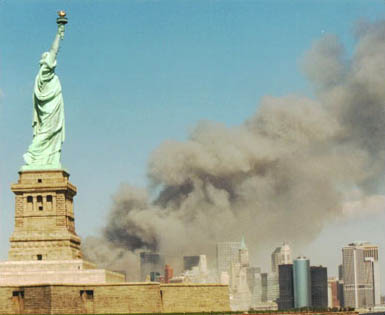 9/11 (Infoplease/National Park Service)
9/11 (Infoplease/National Park Service)
She retailed a couple of anecdotes about Australians and Americans working together to ensure security at the Sydney Olympics and training together in the New York Fire Department prior to 9/11. (A colleague of the Australian firefighters died in the World Trade Centre collapse.)
Together in the hardest of times [she began her lengthy peroration]. Friends for the future. When our alliance was signed sixty years ago, the challenges of the space age were still to come. The challenges of terrorism were still to come. For sixty years, leaders from Australia and the United States have looked inside themselves and found the courage to face those challenges. And after sixty years, we do the same today. To protect our peoples. To share our prosperity. To safeguard our future. For ours is a friendship for the future. It has been from its founding and remains so today.
You have a friend in Australia. And you have an ally. And we know what that means. In both our countries, true friends stick together … in both our countries, real mates talk straight. So as a friend I urge you only this: be worthy to your own best traditions. Be bold.
In 1942, John Curtin – my predecessor, my country’s great wartime leader – looked to America. I still do. This year you have marked the centenary of President Reagan’s birth. He remains a great symbol of American optimism. The only greater symbol of American optimism is America itself. The eyes of the world are still upon you. Your city on a hill cannot be hidden. Your brave and free people have made you the masters of recovery and reinvention.
As I stand in this cradle of democracy I see a nation that has changed the world and known remarkable days. I firmly believe you are the same people who amazed me when I was a small girl by landing on the moon. On that great day I believed Americans could do anything. I believe that still. You can do anything today.
Does Gillard win the prize? It’s difficult to make comparisons across generations. Hawke and Rudd are not directly comparable because they were not speaking about the American alliance. Then there is a buttoned-up, post-Menzian diffidence about Holt and Gorton which constrained their efforts somewhat although their sycophancy valves were certainly open.
Menzies, Hawke and Howard
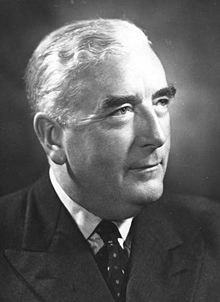 Prime Minister Menzies (Wikipedia)
Prime Minister Menzies (Wikipedia)
There are three direct precedents for Gillard’s speech, however. In August 1950, Prime Minister Menzies spoke to both chambers of Congress about how Australia would send troops to Korea to fight alongside Americans and others. Much of Menzies’ remarks were about the menace of communism but his speech to the Senate ended with this brief rhetorical flourish:
Great or small, we can and must trust each other. Let us have the spirit of the Kokoda Trail and the Coral Sea. It is in this sense that we of Australia are proud to call ourselves your junior partner in a great and continuing adventure toward human liberty.
To the House of Representatives Menzies said that, ‘as a representative of a numerically small people’, he could ‘speak quite frankly to an enormous power in the spirit of brotherhood’. Relative size was on his mind, as it was on Gorton’s 20 years later.
Five years later, in March 1955, Menzies again addressed both Houses of Congress, although he spoke only briefly on both occasions. He referred to the United States as ‘a nation that stands so high in the goodwill and understanding and the memories of the Australian people’.
Prime Minister Hawke spoke to a joint sitting of Congress in June 1988. Some of the speech was about shared values and shared history, a lot more about trade and economics (Hawke made clear that national interests in these fields would not necessarily coincide), defence issues and the impact of change in the soon-to-be former Soviet Union. There is a slightly grumpy tone to Hawke’s whole speech – the journalist Alan Ramsey claimed it was just ‘endlessly redrafted’ – and his final paragraph was judicious rather than excessively fulsome:
Prime Minister Hawke and President Reagan, Washington 1985 (ABC)
No nation in the world surpasses the United States in justifiable pride in past achievements, confidence that problems can be overcome and contagious optimism about the future. Neither of us would claim that our nation is without blemish. Neither of us would claim that governments of our countries have always chosen wisely or acted well. But I do say this: that when all is said and done the United States of America is a great and a good country; that the people of the United States of America are a great and a good people; and that in Australia you will have in the years ahead the best kind of friend, independent to be sure, forthright in defence of our own interests certainly, but also firmly supportive and deeply proud of our rich and enduring relationship.
Then there was Prime Minister Howard, who addressed the two houses of Congress in June 2002. He later described his speech as the highlight of his political life, although only 35 of the 535 members of the two chambers attended. (This is standard practice for addresses by visitors to Congress, with the bulk of the seats being taken up by congressional staff and invited guests. The same happened with Gillard.)
 Prime Minister Howard, 2002 (News Ltd)
Prime Minister Howard, 2002 (News Ltd)
Howard’s speech was shorter than either Gillard’s or Hawke’s and more solemn in the aftermath of 9/11 which Howard had witnessed up close the previous year. (Alan Ramsey described Howard’s effort as ‘an absolute snore’.) He talked about shared values, the importance of families, liberty and voluntarism, strategic challenges in the Pacific, globalisation and trade agreements, and lodged a complaint about a recent Farm Bill. But the rhetoric was low-key, almost pedestrian:
The bonds between Americans and Australians are strong and genuine. They are based on many shared values. A belief that the individual is greater than the State. A belief that strong families are a nation’s greatest resource. A belief that competitive capitalism is the key to national wealth … America has no better friend in the world than Australia. Australians and Americans enjoy each other’s company. We share a love of sport and are fierce competitors in some. And from time to time we even share the Academy Awards.
Decision time: a tearful Speaker Boehner – and the pay-off
So, on those comparisons, Gillard is hard to beat. Her speech contains far better writing than Rudd’s pious schmaltz for Anzac (which he may well have written himself), it does sincerity as well as Hawke at Gallipoli (a speech written by Graham Freudenberg), it includes slabs of practical policy like Hawke’s and Howard’s Washington speeches. But Gillard’s speech lacks Hawke’s caveats and sails far above Howard’s sober tones: it is gushing, embarrassing, and fawning; if ‘real mates’ may ‘talk straight’ to each other then large sections of this speech are sidling, circumlocutory and cloying.
Only a Washington audience recently starved of brown-nosing could have lapped up Gillard’s speech. Phil Coorey in the Sydney Morning Herald said listeners in Australia would have thought it ‘sounded at times fawning, even a little obsequious’. ‘To Australian ears’, said the BBC’s Katie Connolly, ‘the flattery seemed heavy-handed. A bit desperate. Aussies might have called it crawling, or sucking up – not a desirable trait.’ But House Speaker Boehner was reduced to tears; admittedly, he cried a lot during his career. Boehner led the assembled staffers, guests and a smattering of senators and representatives in six standing ovations and ten seated rounds of applause.
One can imagine a future American President, on being ‘talked straight to’ by an Australian prime minister, responding, only half in jest, ‘But Julia Gillard said in 2011 that the United States can do anything!’ The type of alliance that can generate this sort of hyperbole (which Prime Minister Gillard once famously pronounced ‘hyper-bowl’) does not sound like one where allies regularly talk straight to each other – or at least where the ‘comparatively small’ ally, to use John Gorton’s term, talks straight to the ‘great’ one and keeps at it.
 Prime Minister Gillard, Speaker Boehner (tearing up), Senator Inouye, 2011 (Courier-Mail)
Prime Minister Gillard, Speaker Boehner (tearing up), Senator Inouye, 2011 (Courier-Mail)
As with Anzackery, prime ministers who make much of the American alliance may well just be reflecting public opinion about the importance of the link. But, just as we cringe at Anzackery, may we be allowed to cringe a little – nay, a lot – at phrases like ‘an ally for all the years to come’. For a nation which claims to be egalitarian, straightforward and ‘laconic’, a speech like Julia Gillard’s of 2011 should be called for what it is: saccharine, sentimental tosh. Butler’s reference to ‘heights of sycophancy’ is certainly justified; ‘unprecedented’ is a more difficult call but Butler would have heard and read more of the genre than us and we respect his judgement.
We were going to add that Gillard’s speech was ‘ill-judged’ but it did help lay the groundwork for the Trans-Pacific Partnership trade deal, which we are told is a ‘good thing’ for Australia. Perhaps when small talks to great that is how we have to do it: brown-nosing, embarrassing rhetoric seems to come with the territory when you persist with asymmetric ‘alliances’.
Note: Videos of Hawke, Howard and Gillard’s speeches are available on the internet.
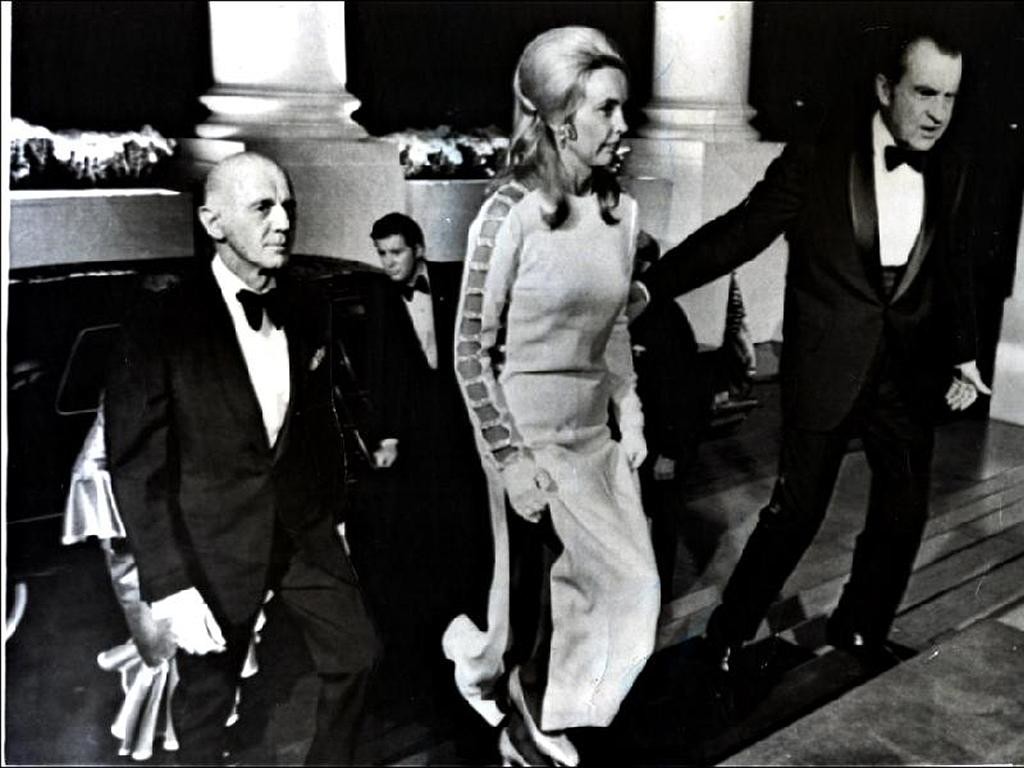 No address: Prime Minister McMahon with Sonia McMahon and President Nixon, 1971 (ABC)
No address: Prime Minister McMahon with Sonia McMahon and President Nixon, 1971 (ABC)


Richard
Thanks for this. I understand a shorter version of the speech is about to appear on Pearls and Irritations blog also. DS for HH.
David, Thank you for a splendid piece of research. I learned a lot from it.
I tend to think that “unprecedented” was probably right, but with two qualifications: account needs to be taken of different styles of rhetoric, determined by the times (a point you make about the post-Menzies period), and it would be misleading for me to claim the necessary recollection of past comparable speeches – which you have now provided. I might then have chosen a different word. My explanation is that I have heard a lot of important/clarion speeches and I watched Gillard’s, live. I cringed and felt I had heard a speech which went way beyond what could be considered self respectful. The militarisation of Australian foreign policy and history was in full flight.